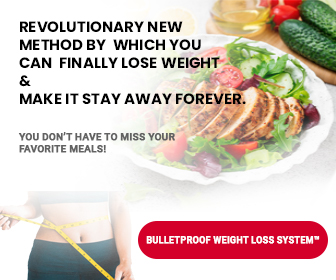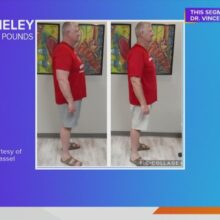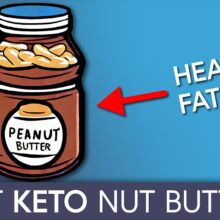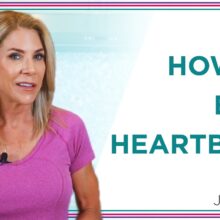The Scientific Consensus on a Healthy Diet
“The Scientific Consensus
on a Healthy Diet” About a decade ago, the American Heart
The association expressed concern that their “2020 target of improving
cardiovascular health by 20 percent by 2020 [would] not be reached
if current trends continue[d].” By 2006, most people were
already not smoking, and had nearly achieved
their goal for exercise. But when it came to a healthy diet
score, only about 1 percent got a 4 or 5 out of their
0 to 5 diet quality score, and that’s with so-called
“ideal” criteria of drinking less than four and a half
cups of soda a week.
In the last decade, they
saw a bump up to like 1 percent of Americans even reaching
those kinds of basic criteria. But given their aggressive goal
of improving that by 20 percent by 2020, they hoped to turn that
1 percent into about 1.2 percent! Okay, so how’d we do?
Let’s look at the 2019 update, and it looks like we’ve slipped
down to as low as one in a thousand— you can’t even see the green anymore. And American teens got a big fat zero. No wonder, perhaps, that “for all
mortality-based metrics, the U.S. rank declined … 27th or 28th
among 34 [industrialized] countries.” “Citizens living in countries
with a substantially lower [GDP] and health expenditure[s]
per capita . . . have lower mortality rates than those
in the United States.” Slovenia beat us by three
countries, coming in at 24th in life expectancy to our 27th.
And more recently we seem to have slipped to 43rd, even
though we spend trillions on health care—more than anyone else. What’s the leading risk factor
for death in the United States? What we eat.
The standard American
diet is just to die for—literally. Those trillions in health care spending
aren’t addressing the root cause. Look at some of these beautiful
lung cancer death curves. It took decades to finally turn the corner, but it’s so nice to finally see those drops. When are we going to
see the same with diet? “Approximately 80 percent of
chronic disease and premature death could be prevented by not
smoking, being physically active, and adhering to a
healthful dietary pattern.” But what exactly is
meant by “healthy diet”? Unfortunately, what we hear
about nutrition in the media is often inconsistent and confusing.

“There[’s a] pressure
within today’s competitive journalism market for sensationalism. There may even be a disincentive
to present the facts in … context…” to sell more magazines. And this
paper was written back in 1997 before the lure of clickbait headlines. In fact, about three-quarters
of a century ago it was noted that unfortunately, “the subject
of nutrition seems to have a special appeal to the
credulous, the social zealot and, in the commercial field,
the unscrupulous,” a combination “calculated to strike
despair in the hearts of the sober, objective scientist.” “The most important [health care]
problem [we face may be] our poor lifestyle choices
based on misinformation.” It’s like the climate change deniers;
“healthy … dietary advice [is] overshadowed by critics,
diet books, [industry interests], and misguided information
in the media.” Maybe what we need is
an IPCC (Intergovernmental Panel on Climate Change) of nutrition.
These days “[n]o single expert,
regardless of academic stature or reputation, has the prominence
to overcome the obstacles created by confusing media
messages and [effectively] deliver the fundamental principles of
healthy living … to the public.” However, what if there was
“a global coalition consisting of a variety of nutrition experts,
who collectively represent the views held by the
majority of scientists, physicians, and health practitioners…”? It could “serve as the guiding
resource of sound nutrition information for improved health and
prevention of disease.” Boom! “The True Health
Initiative was conceived for that very purpose.” A nonprofit
coalition of hundreds of experts from dozens of countries
agreeing to a consensus statement on the fundamentals of healthy living.
Check out
https://www.truehealthinitiative.org/. Spoiler alert—the healthiest diet
is one generally comprised mostly of minimally processed plants.
Long-Forgotten Costa Rican Tradition Helped Me Melt 167Lbs
ᴛɪʀᴇᴅ ᴏꜰ ʙᴇɪɴɢ ᴏᴠᴇʀᴡᴇɪɢʜᴛ
ʜᴏᴡ ᴀ ʟᴏɴɢ-ꜰᴏʀɢᴏᴛᴛᴇɴ ᴄᴏꜱᴛᴀ ʀɪᴄᴀɴ ᴛʀᴀᴅɪᴛɪᴏɴ ʜᴇʟᴘᴇᴅ ᴍᴇ ᴍᴇʟᴛ 167ʟʙꜱ ᴏꜰ ꜱᴛᴜʙʙᴏʀɴ ꜰᴀᴛ ɪɴ ᴜɴᴅᴇʀ 1 ʏᴇᴀʀ ᴡɪᴛʜᴏᴜᴛ ᴅɪᴇᴛ ᴏʀ ᴇxᴇʀᴄɪꜱᴇ!
ᵢ ᵍₒₜ ᶠᵣₒₘ ₂₉₁ ₚₒᵤₙᵈₛ ₐₙᵈ ₘᵢₛₑᵣₐᵦₗₑ, ₐₗʷₐʸₛ ₜᵢᵣₑᵈ ₐₙᵈ ₕₐᵣᵈₗʸ ₘₒᵥᵢₙᵍ…
ₜₒ ₁₂₄, ₛₗᵢₘ ₐₙᵈ ₗₒᵥᵢₙᵍ ₑᵥₑᵣʸ ₛₑᶜₒₙᵈ ₒᶠ ₘʸ ₗᵢᶠₑ!
ɪᴇᴛ ᴏʀ ᴇxᴇʀᴄɪꜱᴇ! ᵢ ᵍₒₜ ᶠᵣₒₘ ₂₉₁ ₚₒᵤₙᵈₛ ₐₙᵈ ₘᵢₛₑᵣₐᵦₗₑ, ₐₗʷₐʸₛ ₜᵢᵣₑᵈ ₐₙᵈ ₕₐᵣᵈₗʸ ₘₒᵥᵢₙᵍ… ₜₒ ₁₂₄, ₛₗᵢₘ ₐₙᵈ ₗₒᵥᵢₙᵍ ₑᵥₑᵣʸ ₛₑᶜₒₙᵈ ₒᶠ ₘʸ ₗᵢᶠₑ!







